Brief History of Science and Technology
The science and technological developments started very early in India. The Indian scientists and their scientific inventions have made greater advancements in all the sectors such as transportation,broadcasting and communications.The people were used scientific measurements to chart their drainage, sewage, water storage and irrigation systems in Indus Valley Civilization.The artificial reservoirs have been excavated at Girnar, which show keen scientific measurements and the first dock in the world was built at Lothal.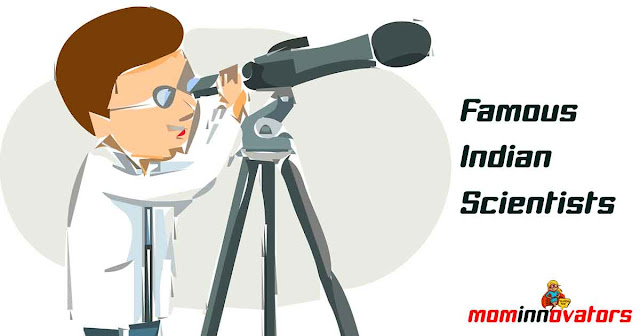 |
| INDIAN SCIENTIST |
The archaeological findings such as hearths, kilns, animal drawn ploughs, ink were made from a mixture of chemicals, mathematical theories, astronomical texts, and knowledge on cataract surgical procedures and smelting was enough proof that India was a scientifically developed country.
The dams, suspension bridges and rock-cut stepwells were emerged in and around 4th century BC.The invention of the cotton gin, mining of the precious metals, building sophisticated ships were also came eventually.The concept of the zero(0) and mathematical system of decimals were originated in India.
The origins of calculus also be traced to India and was discussed by mathematician Bhaskara II in the 12th century and the trigonometry were discuused by the renowned mathematician Aryabhatta. Astronomy was widely discussed subject by the 12th century.
Postcolonial Development
The modern science were originated in Europe.British colonization ensured that the modern innovations were found its way to India.The Indian Association for the Cultivation of Science (IACS) in calcutta was founded by Mahendra Lal Sarkar in 1876.The state of Bengal is knowns as the hub of science.The famous Indian Scientist Sir Jagadish Chandra Bose (1858-1937) ,who was in the filed of radio and microwave optics.He was regarded as the founding father of radio science. Acharaya Prafulla Chandra Ray(1861-1944), who was in the field of chemistry and he has founded India's first Pharmaceuticals company called Bengal Chemicals and Pharmaceuticals.
Post-independence, the growth of scientific study in the country is attributed to Jawaharlal Nehru, and other leaders who wanted India to develop nuclear power. Homi Bhabha's close association with Nehru helped and nuclear power today is the fourth source of electricity in India.
Indian Space Research Organization(ISRO) was established and there came more achievements in the field of science and technology.Aryabhatta was the India's first satellite.The Steel Authority of India (SAIL) was established in 1954 and there were many advancements in the field of biotechnology.
10 Famous Indian Scientists
Sir Jagadish Chandra Bose (1858-1937): He is a Bengali scientist.He was a polymath, a physicist, botanist and archaeologist.He was named one of the father of radio science and is also considered to be the founder father of Bengali science fiction and credited with inventing the crescograph which is a device for measuring the growth of plants.
He has even authored science fiction and led a path-breaking investigation of radio and microwave optics.He was a significant contributor to plant and experimental science. He was also the inventor of wireless telecommunications but did not patent his invention.
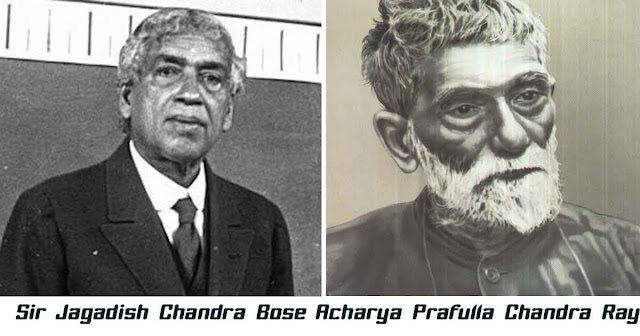 |
| INDIAN SCIENTIST |
Acharya Prafulla Chandra Ray (1861-1944): He is known as the Father of Chemistry in modern India. He was the first person to establish the very pharmaceutical company in West Bengal,India.He has authored a book titled A History of Hindu Chemistry from the Earliest Times to the Middle of the Sixteenth Century in 1924.He established the Indian School of Chemistry and taught at leading educational institutions such as Presidency College and Rajabazar Science College. He has written over 107 papers on all branches of chemistry by 1920.
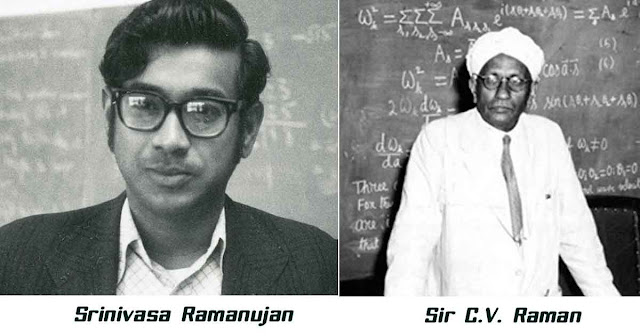 |
| INDIAN SCIENTISTS |
Sir C.V. Raman (1888-1970): A renowned Indian physicist, Sir Chandrasekhra Venkata Raman won the Nobel Prize for Physics in 1930. He is the first Indian Scientist. He discovered that when light passes through transparent material, the wavelengths of some of the rays that are deflected change. This discovery of his was known as Raman Scattering and the result of what is known as the Raman Effect. He was the first Asian to receive a Nobel Prize for Physics. He has found the Tranvancore Chemical and Manufacturing company in 1943. He also established the Raman Research Institute in Bengaluru in 1945.
Meghnad Saha (1893-1956): He is an Indian astrophysicist known for his development of the Saha Equation which is used to interpret the spectra of stars in astrophysics. He also credited with developing the original plan for the Damodar Valley Project. He was the leading architect of river planning in India.
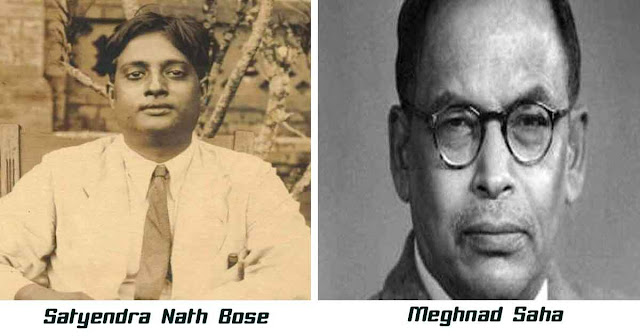 |
| SATYENDRA | MEGHNAD |
Satyendra Nath Bose (1894-1974): He was an Indian physicist who specialized in mathematical physics and known for his work on quantam mechanics.He was awarded the Padma Vibhushan in 1954 by the Indian Government and prior to that Rabindranath dedicated the only book he ever wrote on science-Viswa Parichay to Bose.He was given the role of the National Professor and also he was credited with the highest honour in a country for a scholar.
Homi Jehangir Bhabha (1909-1966): He is known as the Father of Indian Nuclear Programme. He was a well-known nuclear physicist and the founding director of the Tata Institute of Fundamental Research and the Trombay Atomic Energy Establishment which is now known as Bhabha Atomic Research Center.He had convinced Jawaharlal Nehru to start India's nuclear programme for which he established the Cosmic Ray Research Unit at IISc. He was awarded the Padma Bhushan by the Indian Government in 1954 and was part of the Indian Cabinet's Scientific Advisory Committee.
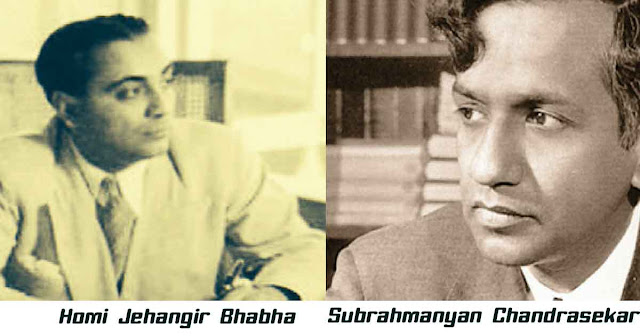 |
| SCIENTISTS OF INDIA |
Subrahmanyan Chandrasekar (1910-1995): He was awarded the 1983 Nobel Prize for Physics for his theories on the evolutionary stages of massive stars. The Asteroid 1958 Chandra was named after him and in 1999, NASA named one if its four Great Observatories after him as well-the Chandra X-Ray Observatory was launched and deployed by the space shuttle Colombia on 23 July 1999.
Har Gobind Khorana (1922-2011): He was a biochemist and a significant contributor to the field of molecular biology. He was also awarded the 1968 Nobel Prize for Physiology or Medicine along with the two other scientists for his research which helped bring out the intricacies of the generic code of the cell.
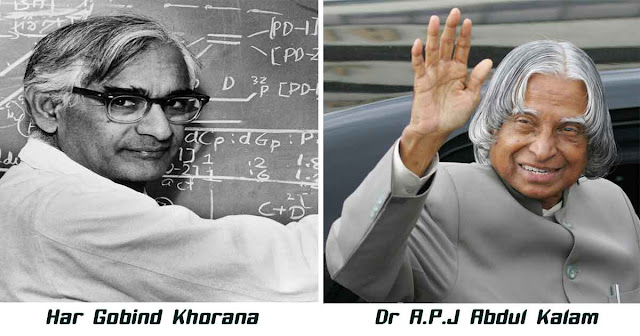 |
| A.P.J ABDUL KALAM |
Dr A.P.J Abdul Kalam (1931-2015): He was a Indian scientist who has worked as an aerospace engineer with the Defence Research and Development Organization. He was the first scientist who has become the President of India. He has been given the moniker of Missile Man of India because he has worked on and extensively researched the development of ballistic missiles and launch of vehicle technology and has played a key role in the Pokhran-II nuclear tests of 1998. He has written many books which have the motivational quotes and one of the famous book was 'Wings of Fire-An Autobiography'. He has been awarded the Bharat Ratna for his work. The government has declared his birthday, 15 October, as the World Students' Day.
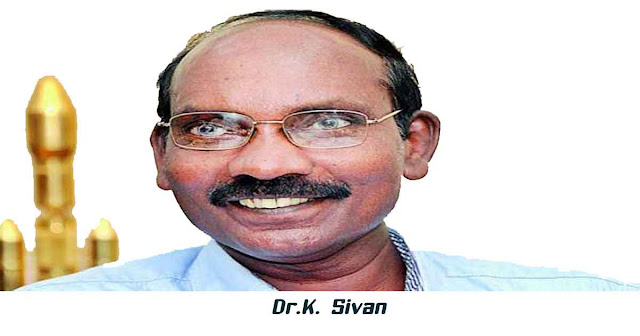 |
| DR.K.SIVAN INDIAN SCIENTIST |
Dr.K. Sivan (b.1931): Dr. Kailasavadivoo Sivan is the current chairperson of the Indian Space Research Organization(ISRO). He had worked in Polar Satellite Launch Vehicle Project in 1982. He served as the Director of the Vikram Sarabhai Space Center before he has taken charge as the chairperson of ISRO. He has played vital roles in mission design, mission integration analysis and end to end mission planning .Chandryaan 2 which was India's second mission to the moon has launched by ISRO under his leadership. He became a well-known scientist even to a small kid after the launch of Chandryaan 2.
Info at a glance
- Sir C.V Raman was the first scientist of India
- Srinivasa Ramanujan birthday was declared as National Mathematics Day
- Acharya Prafulla Chandra Ray is known as the Father of Chemistry in modern India
- Dr A.P.J Abdul Kalam was the first scientist who has became the President of India
- Tessy Thomas is first female scientist to head a missile project in India
- Tessy Thomas is also known as 'Missile Woman of India'
- Gangandeep Kang is the first woman scientist to be elected as a Royal Society Fellow
- Dr. Yusuf Hamied,a Padma Bhushan awardee elected as Honorary fellow

This post have 0 Comment
EmoticonEmoticon